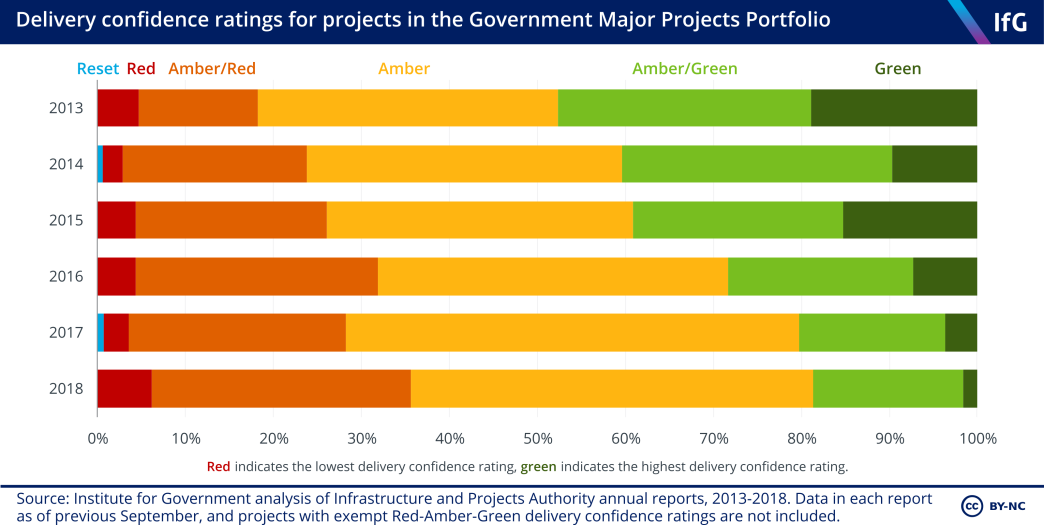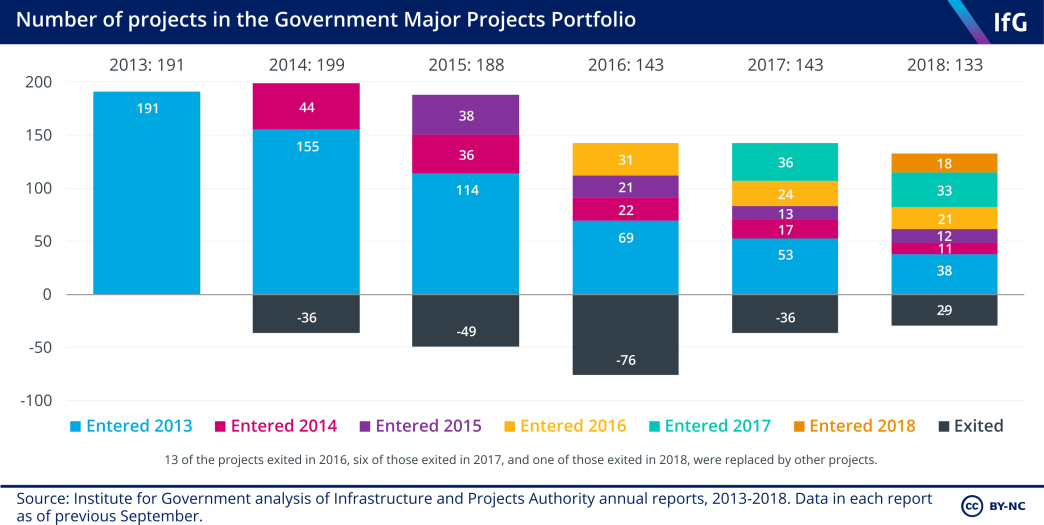Major projects: ministers need to face facts
The Government is becoming less confident that its largest projects will be delivered successfully.
More than a third of the Government’s major projects look unlikely to be delivered on time and on budget. Aron Cheung says that with Brexit sure to impose further obligations, ministers should be realistic about their ambitions.
The Government is becoming less confident that its largest projects will be delivered successfully, with more than a third of major projects – even before counting those relating to Brexit – considered at risk.
This should worry ministers. Cabinet Secretary Sir Jeremy Heywood has described Brexit as the “probably the biggest and most complex challenge the civil service has faced in our peacetime history”. But uncertainty is hampering the Government’s ability to prepare for the changes it will need to implement in areas like customs and immigration – and the timetable could hardly be tighter.
Delivering major projects requires an honest reflection of risks and constraints, adopting realistic timeframes, and effective prioritisation of resources. Ministers must recognise this, otherwise government risks trying to deliver too much too quickly.
Ministers should be willing to hear and respond to difficult news
An Institute for Government report in 2016 found that a “good news culture” and “reluctance to tell ministers of emerging problems” contributed significantly to the difficulties faced by the Universal Credit programme. On Brexit, there are already signs that the Government’s planned transition period will not be enough to deliver all the necessary changes, with HMRC Permanent Secretary Jon Thompson saying that a new customs arrangement will take at least three years to implement once there is agreement on a future model.
The civil service has taken several significant steps to improve its ability to deliver big projects in recent years. In 2016, the Infrastructure and Projects Authority (IPA) was established to “ensure infrastructure and major projects are delivered efficiently and effectively” and since 2012 more than 500 senior civil servants have enrolled in the Major Projects Leadership Academy. Steps like these help professionalise project delivery in government. But for this to be truly transformative, ministers should call on the experts – project delivery professionals – to candidly inform decisions about objectives and timetables. Project professionals should not be relied on just for implementing decisions that have already been made.
The percentage of ‘at risk’ government projects is increasing
The IPA's annual report, published this week, reveals that the Government’s confidence that it can deliver its major projects on time and budget is at its lowest since at least 2012. Of the 133 projects covered in the report, eight had a red rating for what in the jargon is known as “delivery confidence”, indicating “major issues… which at this stage do not appear to be resolvable”. These include five defence projects, two projects overseen by the Department for Transport, and one at the Home Office.
A further 38 projects in the portfolio had an amber/red rating due to “major risks or issues apparent in key areas”.
Together, these projects accounted for 36% of the Government’s portfolio of major projects, twice as much as in 2013.

These ratings are not a full reflection of project performance and the Government has successfully delivered 26 major projects in the past year, including a national flu immunisation programme for children and the construction of the Francis Crick Institute for biomedical research.
Nonetheless, as the IPA's report shows, the Government’s portfolio of major projects is becoming more difficult to deliver, at a time when it is also grappling with Brexit.
Brexit projects are conspicuous in their absence from the Government's Major Project Portfolio
The Government has fewer major projects in its portfolio than it had a year ago (133, down from 143). However, very few of these relate directly to implementing Brexit. This is despite a National Audit Office report last year revealing that there were over 300 Brexit-related workstreams across government, and the Chancellor allocating over £1.5bn to departments to prepare for EU exit in this year’s Spring Statement.

The absence of Brexit projects from the Government’s project portfolio means that no information has been made available about the nature, cost, or progress of these projects. But in its annual report, the IPA notes that being open and transparent about project delivery confidence can bring an “honest reflection of where challenges lie [which] focuses the Infrastructure and Projects Authority and departments on where resource and support is most needed”. This logic should also be applied to Brexit-related projects.
- Topic
- Public finances Brexit
- Keywords
- Infrastructure Public spending
- Administration
- May government
- Publisher
- Institute for Government